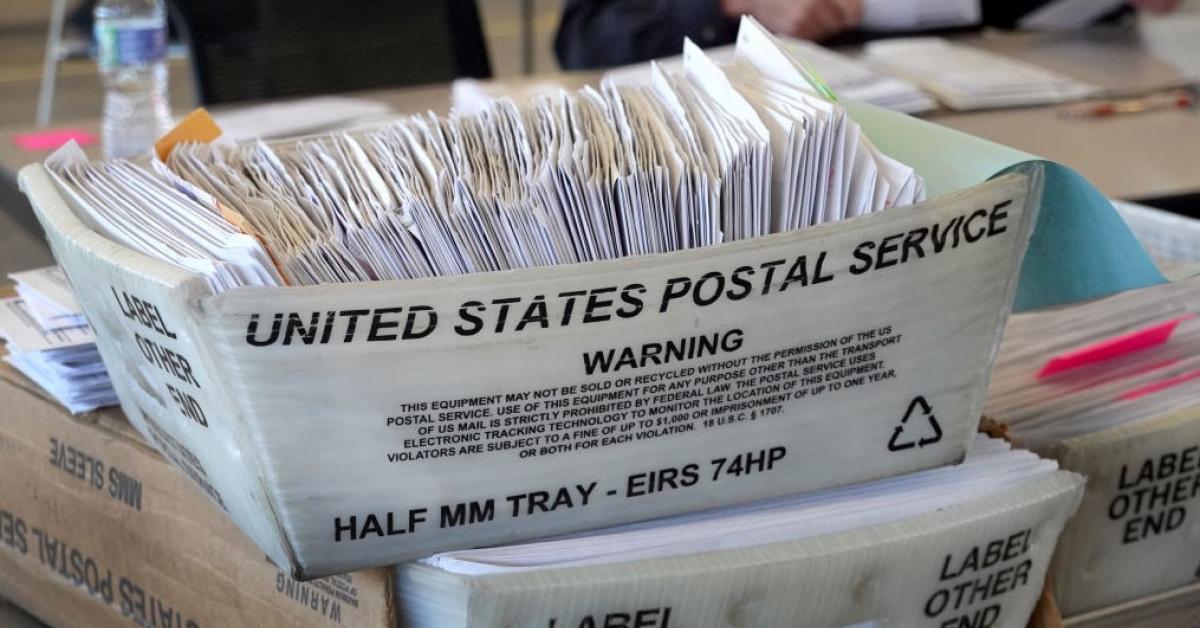We support our Publishers and Content Creators. You can view this story on their website by CLICKING HERE.

A vice president of Hillsdale College received a mail ballot from Washington, D.C., that was addressed to a voter who does not live at his residence, adding to concerns over absentee ballot processes across the country.
Issues regarding fraud and abuse of mail-in ballot issues have recurred this election cycle, including in the nation’s capital. A D.C. mail ballot was somehow sent to a Michigan residence belonging to a member of Hillsdale College’s senior leadership, addressed to a person who may never have lived there.
Hillsdale College Vice President and General Counsel Robert Norton told Just the News on Wednesday that he received a mail ballot from the District of Columbia Board of Elections on Tuesday that was addressed to a person who does not live at his residence.
The mail ballot for the general election was addressed to an “Anne V. Palazzo” in Jonesville, Mich. However, Norton said that he is unaware of anyone with that name living at his address for at least 40 years. “I opened the mail, realized what that was, and thought, ‘what the heck?’ and then I looked at the label” and saw it was from D.C., Norton said.
He noted that he checked with family members and no one recognized the name, and that this raises multiple questions as to how he received the mail ballot. “Who submitted this, how did I end up getting it, and is it part of a broader scheme of some kind?” Norton asked. He added that it brings the integrity of the mail ballot process into question, particularly how people can request absentee ballots.
Norton said that he wants this issue to be addressed and will do whatever is necessary to ensure it does not happen again.
In Washington, D.C., all active registered voters receive mail ballots. However, if a voter will not be at their D.C. residence during the election, then they can request a mail ballot be sent to another address.
The D.C. Board of Elections did not provide comment by publishing time, and attempts by Just the News to find Palazzo were unsuccessful.
Not just D.C.
A similar issue has occurred in Wisconsin with military absentee ballots. In March, Milwaukee Election Commission Deputy Director Kimberly Zapata was found guilty by a jury after obtaining absentee ballots for fake military members in the 2022 election and sending them to a GOP state legislator.
Zapata received a sentence in May of one year of probation, 120 hours of community service, and a $3,000 fine after being convicted on a felony count of misconduct in public office and three misdemeanor counts of making a false statement to obtain an absentee ballot.
The former elections official was fired in November 2022 after she had the three absentee military ballots sent to Republican state Rep. Janel Brandtjen, who turned the ballots in to the Waukesha County sheriff.
At the time, Brandtjen said that she “believe[s] someone was trying to point out how easy it is to get military ballots in Wisconsin. Registration for military ballots is not required, so a fictitious name and birthdate is all that is required to obtain a military ballot online. Feeling shocked about this situation is an understatement because it demonstrates stolen valor from those who protect this nation.
“I think it’s sad that people feel they have to break the law to get the attention of the legislature,” she added. “This is now the second time citizens have tried to point out loopholes in our elections.”
Brandtjen said in August that she had recently received a letter for one of the fake voters.
“‘Holly Adams’ is one of several fictitious military names the Milwaukee deputy clerk created to send legitimate ballots to my home. To clarify, a Milwaukee clerk used fake identities to send authentic ballots to my address. Eighteen months after discovering this, I am still receiving mail for the fictitious ‘Holly Adams,’” Brandtjen said.
There have been numerous irregularities regarding mail-in ballots over the years.
“Serious risks to election integrity”
A report released by the Government Accountability Institute (GAI) last Wednesday regarding the top 50 election threats that the U.S. is facing includes mail-in ballots on the list. “Voting by mail, also known as automatic absentee voting, is very convenient but can pose serious risks to election integrity,” according to the GAI report.
“Ballots can be lost in the mail or manipulated, and a secure chain of custody is impossible to guarantee. Twenty percent of poll respondents who voted by mail admitted to committing at least one kind of fraud. These are very difficult to verify, even when you require matching signature verification. Ballots can arrive late and raise difficult questions about when vote counting will conclude.”
In 2005, the bipartisan Commission on Federal Election Reform – which included ex-President Jimmy Carter and former Secretary of State under President George H. W. Bush, James Baker – highlighted the issues that concerned them about absentee ballots.
“While vote by mail appears to increase turnout for local elections, there is no evidence that it significantly expands participation in federal elections,” the commission wrote. “Moreover, it raises concerns about privacy, as citizens voting at home may come under pressure to vote for certain candidates, and it increases the risk of fraud.”
“Vote by mail is, however, likely to increase the risks of fraud and of contested elections in other states, where the population is more mobile, where there is some history of troubled elections, or where the safeguards for ballot integrity are weaker,” the commission also said.
Last month, the Republican National Committee sent a letter to Montgomery County, Pa., demanding that it cease distributing mail ballots, claiming that the ballots have not undergone required logic and accuracy testing.
In Connecticut, after ballot harvesting occurred during the September primary election last year and resulted in a court-ordered “redo” election, Democratic Secretary of the State Stephanie Thomas advised voters to cast their ballots in person ahead of the Bridgeport mayoral redo primary election in January.

 Conservative
Conservative  Search
Search Trending
Trending Current News
Current News 





